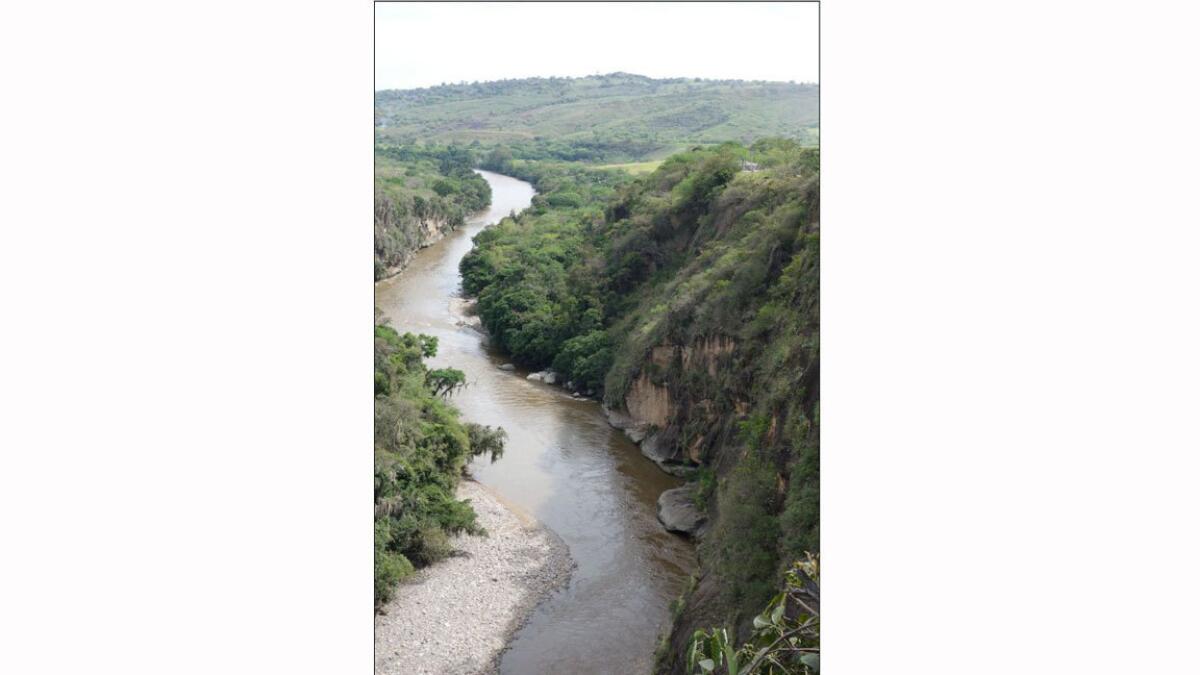Opponents of planned Colombian dams take heart from OAS report

- Share via
Reporting from NEIVA, Colombia — Opponents of a Chinese plan to construct several dams along Colombia’s longest river said they were encouraged by an international human rights panel’s report Friday that noted “tension” between Latin American mega-projects and “the full exercise of human rights.”
The report, issued by the Organization of American States’ human rights commission, addresses testimony last month in Washington by Colombians who protested alleged human rights abuses, including forced displacement, in connection with plans to dam sections of the nearly 1,000-mile-long Magdalena River.
“The response by the OAS encourages us to continue to resist these mega-projects and to urge the government to adopt a development model other than the mining and energy mega-projects they favor,” said Miller Dussan, a university professor and opposition leader who went to Washington to protest the development plan.
The Colombian dispute points up a common theme across much of Latin America: how the needs of Third World countries to improve the standard of living with massive public works can bump up against the human rights of those affected by such projects.
The master plan for more than a dozen dams, power plants and canals was drawn up by Hydrochina, a government-owned Chinese engineering and power developer that probably would be the contractor for some of the facilities. Hydrochina also has projects underway in Ecuador and Bolivia.
In addition to the issue of residents being forced from their land to make way for the reservoirs the dams would create, the plan raises environmental questions that opponents say the government has not fully investigated. Those include “rising temperatures, that could affect agriculture and the future of the river itself,” said Dussan, a philosophy professor at Neiva’s University of Southern Colombia.
In a separate, emailed statement, Emilio Alvarez Icaza, executive secretary of the OAS’ Inter-American Commission on Human Rights, said rights conflicts created by mega-projects were “not exclusive to Colombia. We are following with close attention what is happening in various countries in the region.”
Development of the Magdalena River has already begun, with construction of the $1-billion El Quimbo dam and hydropower complex near Neiva. The project, being built by the Italian-Colombian firm Emgesa, is expected to produce enough electricity to light 8% of the homes and businesses in Colombia.
But El Quimbo is displacing thousands of mostly poor farmers and peasants, who have mounted numerous protests and blockades, saying they will be illegally forced from their homes after being excluded from the decision-making process. The Chinese plan envisions at least six other dams in Huila province, whose capital is Neiva.
“A lot of the river would disappear as a living entity with this plan,” said Ricardo Baez, an architect in San Agustin, an archaeological zone and popular tourist destination in southern Huila. “If it changes the climate as some people think, coffee growers could be affected and so could the high-altitude ecosystem where the river originates.”
President Juan Manuel Santos has touted development of the Magdalena River as a necessary step in improving its navigability and generating cheaper electricity, some of which could be exported. Colombia already gets 70% of its energy from hydropower.
Cormagdalena, a government agency charged with promoting economic development along the river and adjoining districts and which commissioned the master plan, did not immediately respond to a request for comment on the OAS report. A spokeswoman said the agency had not seen the report.
Monti Aguirre, who is Latin America program coordinator for International Rivers, a Berkeley-based civil society group that generally opposes major hydro projects, said Latin American resistance to big dams was growing as “citizens become more aware of their rights and, in Colombia’s case, how their constitution protects them.”
Colombia’s constitutional court ruled in favor of some of the El Quimbo protesters’ human rights claims this year, although some opponents acknowledge that the chances are slim that the massive project, now about half completed, will be stopped.
Kraul is a special correspondent.
More to Read
Sign up for Essential California
The most important California stories and recommendations in your inbox every morning.
You may occasionally receive promotional content from the Los Angeles Times.










